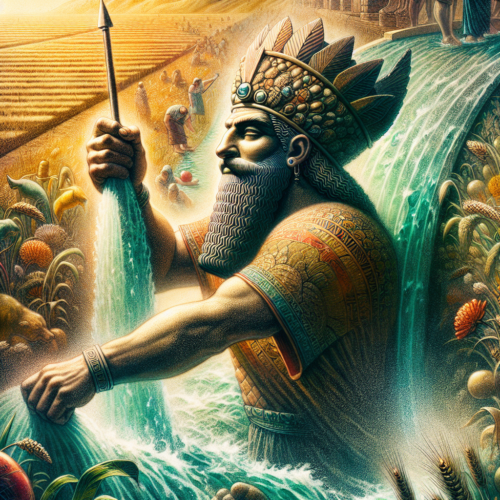Enkimdu is a lesser-known deity in ancient Mesopotamian mythology, specifically associated with farming and agriculture. His role centers around the irrigation and cultivation of the land, making him a vital figure in the context of Mesopotamian society, which heavily relied on agriculture for its sustenance and economic stability.
Enkimdu is depicted as the god of ditches and canals, a role that highlights his importance in the management of water resources for farming. His responsibilities include overseeing the irrigation systems that distribute water from the Tigris and Euphrates rivers to the fields, ensuring that crops receive the necessary water to grow. This function makes him a crucial deity for farmers and all those involved in agricultural production.
While specific iconographic representations of Enkimdu are not as prominent or detailed as those of major gods like Enlil or Enki, he is often associated with symbols of agriculture such as the plow and the yoke. These symbols reflect his connection to the earth and his role in fostering the growth of crops.
Enkimdu features in the myth “Inanna Prefers the Farmer,” where he is depicted in a contest with Dumuzi, the god of shepherds, for the affection of Inanna, the goddess of love and war. In this narrative, Enkimdu represents the agricultural lifestyle, promoting the benefits of a settled, farming-based life as opposed to the nomadic, pastoral life represented by Dumuzi. This myth underscores the societal value placed on agriculture and its foundational role in the stability and prosperity of Mesopotamian city-states.

Enkimdu’s worship would have been particularly relevant in rural areas and among communities directly involved in agriculture. Rituals and offerings to Enkimdu would likely have sought his blessings for bountiful harvests and the effective management of water for irrigation. His veneration reflects the practical concerns of Mesopotamian society, where successful agriculture was a matter of survival.
Enkimdu’s legacy as a deity of agriculture and irrigation continues to symbolize the ingenuity and resourcefulness of Mesopotamian civilization in mastering their environment. His role in mythology and religion underscores the interconnectedness of human culture with the natural world, particularly in how ancient societies understood and harnessed natural resources for agricultural development.
